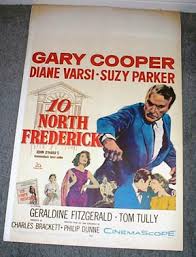
TEN NORTH FREDERICK
US, 1958, 101 minutes, Black and white.
Gary Cooper, Diane Varsi, Suzy Parker, Geraldine Fitzgerald, Stuart Whitman.
Directed by Philip Dunne.
Ten North Frederick is based on a novel by John O'Hara. It was adapted for the screen and directed by Philip Dunne, writer-director of a number of popular 20th. Century- Fox films of this time: Prince of Players, Hilda Crane, Blue Denim. It is photographed in Cinemascope - in black and white. The score is by Lee Harline.
This kind of film was popular at Fox Studios in the second part of the 150s: Peyton Place, From the Terrace, The Best of Everything. It is a piece of Americana - highlighting the surface respectability and the, sometimes lurid, problems underneath. The film has a strong cast: Gary Cooper in one of his final roles, Geraldine Fitzgerald being venomous. Diane Varsi and Stuart Whitman were in the early years of their careers. The film is the kind of material that, in the '70s and '80s, was to be very popular as a series (Dynasty, Dallas) or in mini-series.
1. Entertaining drama? Popular Americana? The work of John O'Hara? Surface respectability - and the sins and humanity of American families?
2. Quality production, black and white photography, Cinemascope, Lee Harline's score? The strong cast?
3. The work of John O'Hara and his observations on American society? Sardonic? The period considered? Respectable families and houses? Dynasties? Politics and morals?
4. The title and the focus on the respectable address and house? A 'good' family? The ironies? Appearances and reality?
5. The structure of the film: problems, flashback, the portrait of Joe Chapin, his family, downfall?
6. The importance of the Chapin family? Cary Cooper's presence as Joe? The basically decent man, relationship with wife, child ren? His work? Involvement in politics? Honesty, corruption? Relationship with Edith and her dominance, love of power, venom, control of the children, saving face? His children rebelling and his handling of the situation? Allowing Joby his career? His paying off Charlie Bongiorno? A symbol of American politicians - in the light of subsequent revelations and histories?
7. Gary Cooper's portrait of Joe as a decent man? Relationship with his colleagues, work? The background of '30s and '40s politics? Possibilities for such men to rise to presidential power? The style of campaigns and issues? The importance of entertaining - and Edith as hostess? Edith and her power, contacts, her dominance? The experience of Anne's affair and the paying off of Charlie Bongiorno - consequences for the campaign? Joe being humiliated? Edith's taunts? Her affair? The encounter with Kate? The clandestine affair? The effect on Joe's tenderness? Questions of emotion and honour? The decision to break off the affair? The gift? His death? A seeming failure?
8. The portrait of Edith as the strong woman, wife, matriarch? Her tongue, manner? Her controlling Joe? Her political ambitions? Her taunts at his failure? The affair? Her keeping face at his funeral? Joby's outburst and her slapping him? A woman of surface respectability, harsh realities within her?
9. Anne and the pressures of the Chapin family? Her social status? The infatuation of Charlie, his charm, music? Pregnant? The miscarriage? His being paid off? The trauma for her life? New York, work, Kate, the apartment? The return for the funeral? Her awareness of her father's relationship when she saw the Ruby? The impact of family and ambition on the next generation?
10. Joby and his relationship to his father, mother? Yale pressures? Musical career? Expectations? Drinking? The final outburst at the funeral?
11. The friendship of Kate and Anne, the chance encounter if Kate with Joe, the beginning of the affair, the relationship of the older man with the younger woman, Joe's tenderness. Kate's response, the gift of the ring? Kate's marriage?
12. The sketch of Charlie Bongiorno and his style, charm, music, background? Relationship with Anne? The pay-off sequence and his surly attitude towards Joe?
13. The portrait of political colleagues? Political expediency? The film's treating of a variety of themes: ambition, illusions, failure, crooked politics, megalomania, American matriarchy, small-town hypocrisy, the problems of the young and romance, pregnancy, romantic attachments between the young and the middle-aged? An entertaining exploration of these themes?